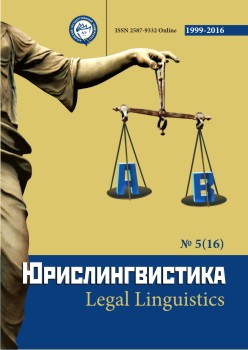ON THE ISSUE OF INTERLOCUTOR MUTUAL UNDERSTANDING AS APPEAR IN FORENSIC EXPERTISE OF THE TEXTS LINKED TO CORRUPT PRACTICES
Abstract
The article is dedicated to one of possible options of methodology of forensic expertise of the texts connected with corruption practices. The expert is challenged to define a topic of conversation, its contents, to trace existence of mutual understanding between interlocutors.
Downloads
Metrics
References
Падучева Е. В. Ситуация речевая // Русский язык: Энциклопедия. – М., 2003. – С. 480–481.
Петрова С. Н. Контекст декодирования // Эффективная коммуникация: история, теория, практика: Словарь-справочник. – М., 2005. – С. 604–605.
Тумина Л. Е. Диалог // Эффективная коммуникация: история, теория, практика: Словарь-справочник. – М., 2005. – С. 533–535.
REFERENCES
Paducheva Ye. V. Situation of speech [Situatsiya rechevaya]. Russkiy yazyk: Entsiklopediya – Russian: Encyclopedia. M, 2003. Pp. 480-481.
Petrova S. N. Context of decoding [Kontekst dekodirovaniya]. Effektivnaya kommunikatsiya: istoriya, teoriya, praktika: Slovar'-spravochnik – Effective communication: history, theory, practice: Dictionary-Directory. М, 2005. Pp. 604-605.
Tumina L. Ye. Dialog [Dialog]. Effektivnaya kommunikatsiya: istoriya, teoriya, praktika: Slovar'-spravochnik – Effective communication: history, theory, practice: Dictionary-Directory. М, 2005. Pp. 533-535.
Copyright (c) 2017 Юрислингвистика

This work is licensed under a Creative Commons Attribution 4.0 International License.
The authors, which are published in this journal, agree to the following conditions:
1. Authors retain the copyright to the work and transfer to the journal the right of the first publication along with the work, at the same time licensing it under the terms of the Creative Commons Attribution License, which allows others to distribute this work with the obligatory indication of the authorship of this work and a link to the original publication in this journal .
2. The authors retain the right to enter into separate, additional contractual agreements for the non-exclusive distribution of the version of the work published by this journal (for example, to place it in the university depository or to publish it in a book), with reference to the original publication in this journal.
3. Authors are allowed to post their work on the Internet (for example, in a university repository or on their personal website) before and during the review process of this journal, as this may lead to a productive discussion, as well as more links to this published work (See The Effect of Open Access).










